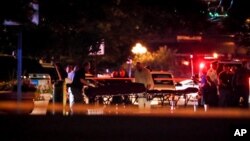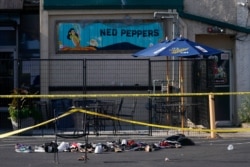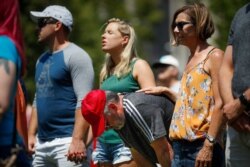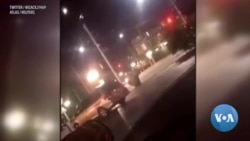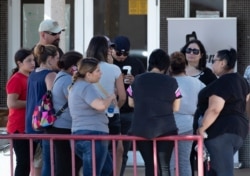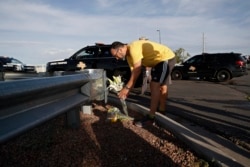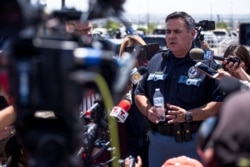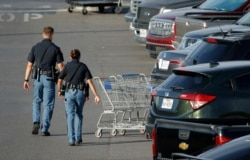Updated Aug. 5, at 3:00 AM
In 13 hours of carnage in the United States, two shooters in separate incidents killed 29 people and injured dozens, leaving authorities searching for motives behind the mayhem.
U.S. President Donald Trump on Sunday ordered flags at all government buildings to be flown at half-staff for the next five days, "as a mark of solemn respect for the victims of the terrible acts of violence" in El Paso, Texas and Dayton, Ohio.
Officials say they will seek the death penalty for the Texas attack which they are treating as an act of domestic terrorism.
"Hate has no place in our country," Trump said Sunday, telling reporters "a lot of things are being done" to stop future attacks.
He called the killings a mental health issue and said he planned to make a more extensive statement about the killings Monday morning.
"Our nation mourns with those whose loved ones were murdered in the tragic shootings...and we share in the pain and suffering of all those who were injured in these two senseless attacks," he said.
A gunman wearing body armor and carrying extra magazines of ammunition was shot to death by police less than a minute after he opened fire early Sunday in a popular nightlife area in the Midwest city of Dayton. The man killed nine people including his own sister and wounded at least 27, four seriously.
Police said they believe there was only one shooter in the incident, 24-year-old Connor Betts, who said on social media that he was a psychology student at a community college in the Dayton area. But police have yet to suggest a motive.
They said Betts was white, as were three of the fatalities. The six others were African-Americans.
Dayton Police Chief Richard Beihl said officers were patrolling the crowded Oregon packed with bars, restaurants, and theaters when Betts opened fire. Police shot and killed him within 30 seconds.
She said the gunman was carrying a .223-caliber semi-automatic rifle, the same-sized weapon a gunman employed in one of the most horrific mass shootings in the U.S. in recent years -- the 2012 massacre of 20 schoolchildren and six adults in Newtown, Connecticut, in 2012.
The Ohio bloodshed occurred about 13 hours after police in the U.S.-Mexican border city of El Paso, say a gunman opened fire at a Walmart store, killing at least 20 people and wounding 26 -- an attack authorities say they are investigating as a possible hate crime targeting Hispanics.
Mexican President Andrés Manuel Lopez Obrador says six Mexican citizens were among those killed. Mexicans near the border town liked to cross into El Paso to shop at Walmart.
The El Paso and Dayton incidents are the nation's 21st and 22nd mass killing incidents this year, according to a database compiled by the Associated Press, USA Today and Northeastern University. The archive defines a mass killing as four or more people shot dead, excluding the gunman, at one location. A separate database counts more than 250 incidents this year in which four or more people have been killed or wounded.
The latest shootings came a week after a gunman killed three at a food festival in California and followed the killing of 58 at a country music festival in 2017 in California, 49 at an Orlando, Fla., nightclub in 2016 and 25 at a Texas church in 2017.
Walmart said Sunday it will continue to sell guns and ammunition in its stores despite the El Paso shooting and another deadly shooting just days earlier at one of its stores in Mississippi that ended with two workers killed and a police officer wounded.
U.S. authorities occasionally try to figure out ways to stop the slaughter of innocents in a country where gun ownership is enshrined as a constitutional right. Some lawmakers have attempted to curb gun ownership or stiffen the regulations surrounding gun sales, but have generally been rebuffed by other lawmakers opposed to new restrictions.
Ohio Democratic Senator Sherrod Brown said he is angered state and national lawmakers won't approve more gun controls, saying politicians' "thoughts and prayers are not enough" of a response to mass killings.
FBI Director Christopher Wray said in a statement" "We will bring the full resources of the FBI to bear in the pursuit of justice for the victims of these crimes."
Several Democratic presidential candidates - Senators Cory Booker and Bernie Sanders and former Texas Congressman Beto O'Rourke - blamed Trump's anti-immigrant rhetoric for fostering a climate of hate leading to the El Paso shooting.
"Donald Trump is responsible for this," Booker told CNN. "He is responsible because he is stoking fears and hatred and bigotry."
Mexican President Obrador called on the U.S. to stop confronting social problems "with the use of force and by inciting hate." Trump has called Mexican immigrants "rapists" and "criminals."
Angelica Sala, executive director of the Coalition for Humane Immigrant Rights said, "Even when Donald Trump is out of office, the white nationalism he has unleashed will likely persist and require action to stop it."
But acting White House chief of staff Mick Mulvaney rejected any attempt to blame Trump.
"I blame the people who are sick," Mulvaney told NBC's Meet the Press interview show. "People are going to hear what they want to hear," but added: "This was a political motive by a crazy person."
In El Paso, police chief Greg Allen said police are seeking to confirm that the 21-year-old white male suspect now in custody was the author of an online posting predicting a shooting spree intended to target Hispanics. Police identify the suspect as Patrick Crusius, who lived in the Dallas area, hundreds of kilometers away from El Paso.
The post appeared online about an hour before the shooting and included language that complained about the "Hispanic invasion" of Texas. The author of the manifesto wrote that he expected to be killed during the attack.
The writer of the manifesto denied he was a white supremacist, but decried "race mixing" in the United States, calling instead for territorial enclaves separated by race. The first sentence of the document expressed support for the man accused of killing 51 people at two mosques in Christchurch, New Zealand, in March, after he had posted his own conspiracy theory that non-white migrants were replacing whites.
Democratic Congressman Joaquin Castro of Texas said "This vile act of terrorism against Hispanic Americans was inspired by divisive racial and ethnic rhetoric and enabled by weapons of war. The language in the shooter's manifesto is consistent with President Donald Trump's description of Hispanic immigrants as 'invaders.'"
Castro, chairman of the Congressional Hispanic Caucus, said, "Today's shooting is a stark reminder of the dangers of such rhetoric."
Trump said Saturday that he and first lady Melania Trump "send our heartfelt thoughts and prayers to the great people of Texas."
He also tweeted: "Today's shooting in El Paso, Texas was not only tragic, it was an act of cowardice. I know that I stand with everyone in this Country to condemn today's hateful act. There are no reasons or excuses that will ever justify killing innocent people."




